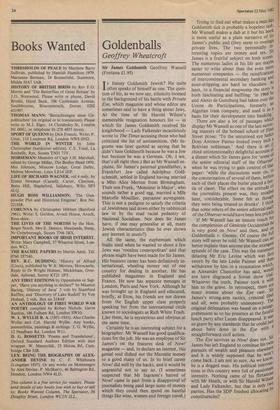Goldenballs
Geoffrey Wheatcroft
Sir James Goldsmith Geoffrey Wansell (Fontana £1.95) Sir James Goldsmith Geoffrey Wansell (Fontana £1.95)
Is Jimmy Goldsmith Jewish? He quite often speaks of himself as one.'The ques- tion of his, as we now say, ethnicity loomed in the background of his battle with Private Eye, which magazine and whose editor are sometimes said to have a thing about Jews. At the time of Sir Harold Wilson's memorable resignation honours list — in which Sir James Goldsmith received his knighthood — Lady Falkender incautiously wrote to The Times accusing those who had criticised the list of antisemitism. (Mr In- grams was later quoted as saying that he didn't hate Goldsmith because he was a Jew but because he was a German. Oh, I see, that's all right then.) But as Mr Wansell ex- plains, Sir James's paternal grandfather, a Frankfurt Jew called Adolphus Gold- schmidt, settled in England having married a Miss Alice Merton from Birmingham. Their son Frank, 'Monsieur le Major', who sounds rather a good egg, married a Mlle Marcelle Mouillier, paysanne auvergnate. This is not a pedigree to satisfy the criteria of Jewishness laid down either by rabbinical law or by the mad racial pedantry of National Socialism. Nor does Sir James have, if one may generalise at all, many Jewish characteristics (has he ever shown any interest in music?)
All the same, the euphemism which Stalin used when he wanted to shoot a few Jews was 'rootless cosmopolitan' and that phrase might have been made for Sir James. His business career has been definitively in- ternational, wheeling money out of one country for dealing in another. He has published magazines in England and France. He now has separate menages in London, Paris and New York. Although he was brought up in England and educated, briefly, at Eton, his friends are not drawn from the English upper class properly speaking but from the international circle known to sociologists as Rich White Trash. Like them, he is mysterious and obvious at the same time.
Certainly he is an interesting subject for a biographer. Mr Wansell has good qualifica- tions for the job. He was an employee of Sir James's on the features desk of Now! magazine — and, to declare an interest, this genial soul dished out the Marmite money to a good many of us. In its brief career Now! did well by the hacks, and it would be ungrateful not to say so. (I sometimes suspected that Mr Ingrams's hatred of Now! came in part from a disapproval of journalists being paid large sums of money which they could then spend on hateful things like wine, women and foreign travel.) Trying to find out what makes a man like Goldsmith tick is probably a hopeless task' Mr Wansell makes a dab at it but his book is more useful as a plain narrative of Sir James's public and (they seem to overlap) private lives. The two perennially in- teresting topics are money and sex. Sir James is a fruitful subject on both scores. The numerous ladies in his life are maybe easier to write about than the even more numerous companies — the ramifications of intercontinental secondary banking and asset-stripping are hard to elucidate. At least, to a financial mugwump the story is both fascinating and baffling: 'in 1968 he and Alexis de Gunzburg had taken over the Union de Participations, formerly an Algerian tram company, and used it as 0, basis for their development into banking. There are also a lot of passages whycl display Mr Wansell as one of the last surviv, ing masters of the hobnail school of Flee` Street prose: 'To the untutored eye Sella Dom Antenor Patino looked every inch 8 Bolivian nobleman.' And there is all (1, think unintentionally) delightful account 01 a dinner which Sir James gave for 'some of the senior editorial staff of the Observer when he was trying to gain control of that paper: 'while the discussions went on, to the consternation of several of them, before each of their places the butler placed a be tie of claret. The effect on the attitude of the journalists present was, they recalled later, considerable. Some felt as though they were being treated as drunks'. I think f that some others of the senior editorial staff of the Observer would have been less prickly If Mr Wansell has an unsure touch for the complexities of Generale Occidentale he is very good on Now! and then, and 0,1; Goldenballs v. Gnome. Of course the full story will never be told: Mr Wansell can rip better explain than anyone else the strangest episode of the case. This was the statement delating Mr Eric Levine which was first sworn by the late Leslie Paisner and then withdrawn by him in a recantation which!, as Alexander Chancellor has said, would not have disgraced a Soviet show trial' Whatever the truth, Paisner took it vii"' him to the grave. In retrospect, there are many ironies about the Eye case. 51r, James's strong-arm tactics, criminal libel and all, were probably unnecessary. Ti original defamation was based on a rnisal,i prehension as to his presence at the fateful lunch party after Lucan disappeared. It Ost so grave by any standards that he could ills about have done in the Eye with ° straightforward civil action. The Eye survives as Now! does not. Sir James has left England to continue his twin pursuits of wealth and pleasure elsewher,e and it is widely supposed that he vvorl t _ come back. I am not so sure. As we know' he is a dogged man. His political interven" tions in this country were full of passionate intensity. Nothing came of his flirtations with Mr Heath, or with Sir Harold Wilsonand Lady Falkender, but that is only two ,,,`" parties. Has the SDP finished allocating 1' constituencies?






































 Previous page
Previous page